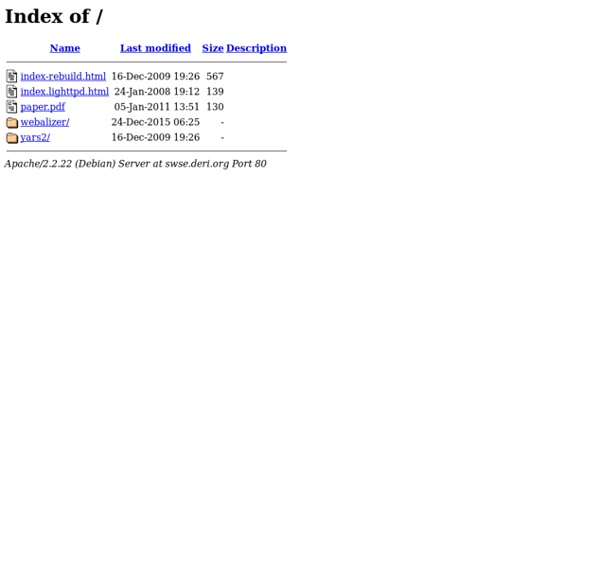



Watson Semantic Web Search This is the Watson Web interface for searching ontologies and semantic documents using keywords. This interface is subject to frequent evolutions and improvements. If you want to share your opinion, suggest improvement or comment on the results, don't hesitate to contact us ... At the moment, you can enter a set of keywords (e.g. "cat dog old_lady"), and obtain a list of URIs of semantic documents in which the keywords appear as identifiers or in literals of classes, properties, and individuals.
Clustering Engine Carrot2 Search Results Clustering Engine Carrot2 organizes your search results into topics. With an instant overview of what's available, you will quickly find what you're looking for. Choose where to search: Type your query: More options Metacrawlers and Metasearch Engines Unlike search engines, metacrawlers don't crawl the web themselves to build listings. Instead, they allow searches to be sent to several search engines all at once. The results are then blended together onto one page. Below are some of the major metacrawlers. Also see the Search Toolbars & Utilities page for metacrawler-style software that you can run from your desktop. Jump To: Award Winners - Other Choices - Specialty Choices All-In-One Search - Meta Search Articles
Disco Hyperdata Browser The Disco - Hyperdata Browser is a simple browser for navigating the Semantic Web as an unbound set of data sources. The browser renders all information, that it can find on the Semantic Web about a specific resource, as an HTML page. This resource description contains hyperlinks that allow you to navigate between resources. While you move from resource to resource, the browser dynamically retrieves information by dereferencing HTTP URIs and by following rdfs:seeAlso links. News 04.03.2007: SemanticWebCentral provides another Linked Data browser called Objectviewer. 03.10.2007: OpenLink has published a new Data Web Browser which, like Disco, also enables you to browse Linked Data on the Web. 01.16.2007: Ivan Herman has written a Disco Bookmarklet.
Plus de 80 outils spécialisés pour différentes recherches sur le web Aller au contenu principal Menu secondaire Formulaire de recherche 20 outils gratuits pour fouiller le web à la recherche d’informations Une simple recherche Google ne résume pas le journalisme web. Une multitude de services gratuits, souvent très simples d’utilisation, peuvent faciliter et accélérer vos recherches en ligne. Note : Ce billet n’aborde pas la recherche d’infos sur les réseaux sociaux, qui fera l’objet d’un prochain post. ↑» Consulter les traces laissées par un site sur le web Un site que vous vouliez consulter a disparu des radars ? Vous pouvez tenter de retrouver des versions archivées sur la machine à remonter le temps de l’Internet Archive.
15 moteurs de recherche alternatifs à Google Il faut bien le reconnaitre, sans Google dans notre vie de tous les jours, nous serions un peu perdu : Google a réponse à tout, nous aide à trouver notre chemin, ramasse notre courrier, nous livre les actus fraiches dès le levé … Pour d’autres, la sensation d’intrusion dans la vie privée, d’espionnage et d’utilisation des données personnelles en ont fait le moteur de recherche à éviter à tout prix. Voyons quelles alternatives s’offrent à vous si vous souhaitez quitter Google. 1.
Search Engines That Don't Track Google, Bing, Yahoo – all the major search engines track your search history and build profiles on you, serving different results based on your search history. Try one of these alternative search engines if you’re tired of being tracked. Google now encrypts your search traffic when you’re logged in, but this only prevents third-parties from snooping on your search traffic – it doesn’t prevent Google from tracking you. DuckDuckGo
Moteurs de recherches spécifiques. Je suis souvent à la recherche des petits plus qui font tout l'intérêt du WEB.... Je viens de m'apercevoir que la WAYBACK MACHINE ne figure pas sur TSGE. Ce service permet aux utilisateurs de retrouver les versions archivées de pages Web à travers le temps : c'est l' « index à trois dimensions » des archives de l'Internet. Fondé en 1996, "Internet Archive" est un organisme à but non lucratif, dont l'objectif est "d'archiver le web". Ses robots collectent depuis 1996 les copies de sites à différentes époques et les rassemblent dans une bibliothèque, qui contient déjà plus de 150 milliards de pages web. La Wayback Machine est l'outil de recherche de ce service qui permet de retrouver simplement l'historique des différentes versions d'un même site, à partir de son URL.
Make Any Dead URL Work Again COLOSSUS KartOO : The First Interface Mapping Metasearch Engine Sweet Search NNDB: Tracking the entire world